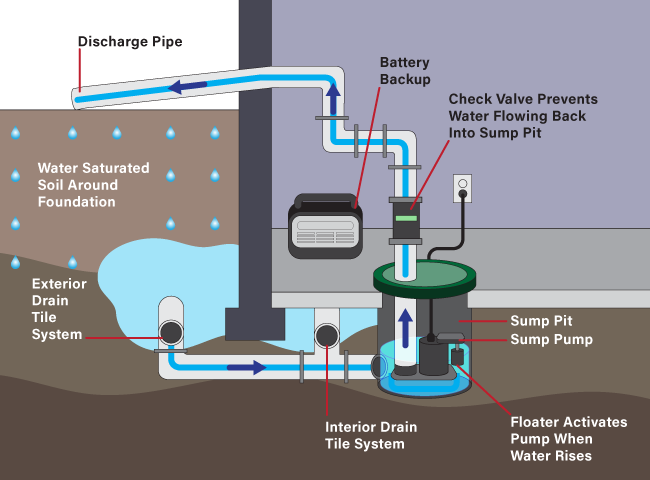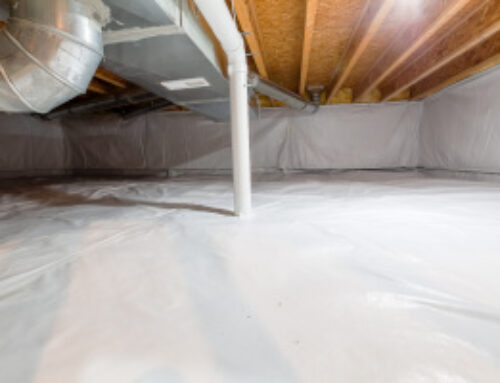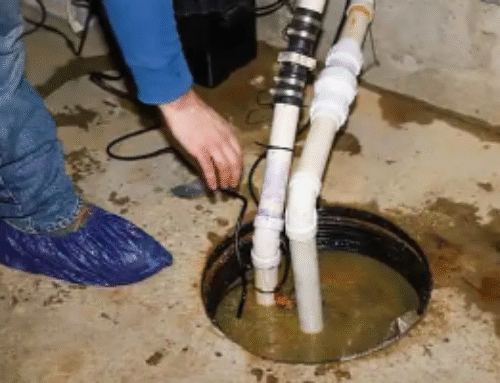If you’ve ever dealt with a wet basement or unexplained moisture in your crawl space, you know how quickly it can become a big problem. After doing some research, you may have stumbled upon a solution: sump pumps.
Understanding what situations call for a sump pump and whether it is suitable for your home is crucial before making any decisions.
While these devices can save you from costly repairs and structural damage, not every home benefits from a sump pump. There are many different options, so you’ll need to discuss them with a reliable sump pump installation team.
Whether you’re seeing signs of water after heavy rain or you’re planning ahead to protect your foundation, it helps to know when a sump pump can make a difference.
A good place to start is learning the basics and understanding what situations call for a sump pump.
How Does a Sump Pump Work? The Role of a Sump Pump Within Your Home

A sump pump is an appliance that transfers water from inside your basement to the exterior of your home. Typically, it is a pit below the concrete flooring.
Another name for this pit is a basin, and it holds the sump pump.
The device contains valves that sense when water levels or pressure are rising. Most of the time, it remains on standby. With a lot of rainfall, the soil around the foundation becomes oversaturated. Excess groundwater flows toward the sump pit, which begins to fill with water.
If water levels rise too high, a switch activates, causing the sump pump to start pumping and send water away from your foundation through a discharge pipe.
This line connects to a specific drainage area.
As the sump pump moves water away from your home, the groundwater won’t reach the level of your basement floor. It prevents a flood and the subsequent damage to your home. You won’t have to deal with mold, mildew, and fungus growth. Insects won’t invade, and you’ll keep your foundation intact.
5 Common Reasons You May Need a Sump Pump Installed
While there are many benefits to installing a sump pump, some homes require this appliance more than others.
If you’ve been wondering what situations call for a sump pump, these are some of the most common reasons homeowners install one.
1. Concerns About Basement Flooding
Does your basement become damp or flood after some rain? You’re not alone. Basement flooding is one of the most common reasons homeowners install sump pumps. This area of your home is more vulnerable because it sits below ground level. It is a natural place for excess water to collect.
After a storm or when snow melts quickly, water can seep through the foundation and accumulate. A sump pump automatically removes that water to keep your basement dry and protect your foundation.
If you’ve experienced pooling water or damp conditions downstairs, this is one of the clearest examples of what situations call for a sump pump. It is a proactive way to stop flooding before it starts and avoid costly repairs.
2. A High Water Table or Heavy Rainfall in the Region
Some areas get more than their fair share of rainfall. These areas are more likely to have excess groundwater that needs somewhere to go. As it accumulates, it creates pressure against the foundation. Eventually, that pressure can lead to cracks and water leakage.
If your yard stays soggy long after a storm or if your neighbors have sump pumps installed, these are good clues that your home may also benefit from one. It can be your first line of defense against Mother Nature.
3. Preserving Finished Basements
What situations call for a sump pump? A good reason to get one is to protect your finished basement. This area of your home adds valuable living space, but it is also a big investment to protect.
Water damage can quickly ruin flooring, drywall, and furniture. If your basement serves as a home office, guest room, or entertainment area, installing a sump pump will protect these important areas.
Even if you’ve never experienced flooding here before, this appliance could pay off. The cost of water cleanup and repairs can far outweigh the investment in a sump pump. It is not just about preventing flooding but also about protecting the comfortable space you’ve created.
4. Past Water Damage or Mold Growth
If you’ve had water damage in the past, you might have also had to deal with mold and mildew damage. In this case, a sump pump would be a wise investment.
Even if it’s minor damage, repeated exposure to moisture can weaken your foundation and lead to poor indoor air quality. It also creates a breeding ground for mold and mildew. A sump pump cannot undo past damage, but it can stop it from getting worse.
5. Controlling Moisture in Crawlspaces
Many homeowners overlook their crawlspace. After all, it’s out of sight, so it stays out of mind. Unfortunately, this neglect is a problem because your crawlspace is a vital part of your home’s structure and air quality.
When excess moisture builds up in a crawlspace, you can end up with wood rot, pest problems, and reduced indoor air quality throughout your home. Installing a sump pump can help manage the moisture, keep the area dry, and prevent crawlspace repairs.
Is A Sump Pump Worth The Cost?
Your home is one of your biggest investments, which is why you need to know what situations call for a sump pump. Having this information could make the difference between preserving your home’s value and managing the cost of water damage repair.
What situations call for a sump pump:
- You notice water buildup anywhere in your basement
- Nature throws a lot of water your way annually
- Your home is in a low-lying area
- You just finished your basement
A sump pump works like a safety net, helping prevent basement flooding and related repairs. Keeping moisture under control helps protect the structure from long-term damage. It is a simple step that can go a long way in helping your home stay solid and dry for many years.
Having standing water in your basement can also impact your health. Damp environments are the perfect place for bacteria, fungi, and other pathogens to grow.
These microorganisms release toxins that can trigger respiratory and other health problems, especially if you have allergies or asthma. A sump pump will reduce this risk by keeping your basement free of moisture.
Choosing the Right Sump Pump for Your Needs
If knowing what situations call for a sump pump is the first step, choosing the right device is the next. Every home has different needs, so the sump pump your neighbor has might not work for you.
There are two primary classes of sump pumps: submersible and pedestal. A submersible pump is quieter but more efficient. It sits within the pit and is often more expensive.
In contrast, a pedestal sump pump sits above the pit. It is easier to install, but it produces more noise. This type of sump pump may be more affordable for those with a lower budget.
Aside from choosing the type of pump, there are other factors to consider:
- Pump capacity
- The vertical distance the pump needs to lift water
- Automatic vs. manual
- Warranty and service
- Installation and maintenance
Choose a device made from corrosion-resistant materials, such as stainless steel, to ensure it remains reliable for a long time.
FAQ
Get Expert Guidance on Sump Pumps From the Professionals at Crossroads Foundation Repair
Investing in a sump pump is not a decision to be taken lightly. However, if you want to protect your property from water damage, the answer is clear. Sump pumps remove excess water to keep your basement safe, dry, and free from mold growth.
Don’t ignore this potentially essential addition to your home. If you still have questions about what situations call for a sump pump or are looking for basement waterproofing services, the experts at Crossroads Foundation Repair can help.
Contact us today to schedule a free estimate and keep your home safe and dry!




